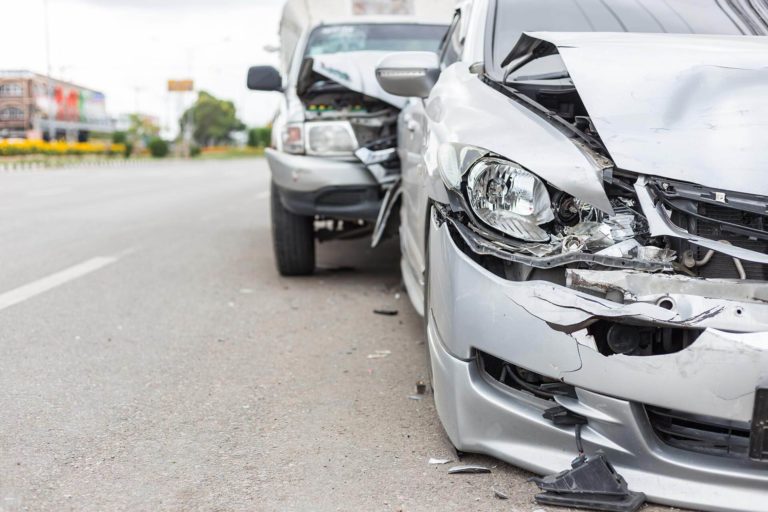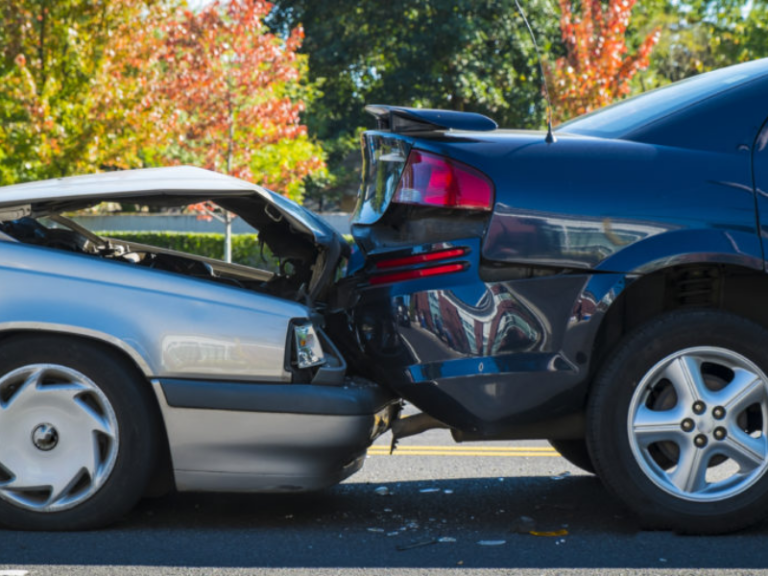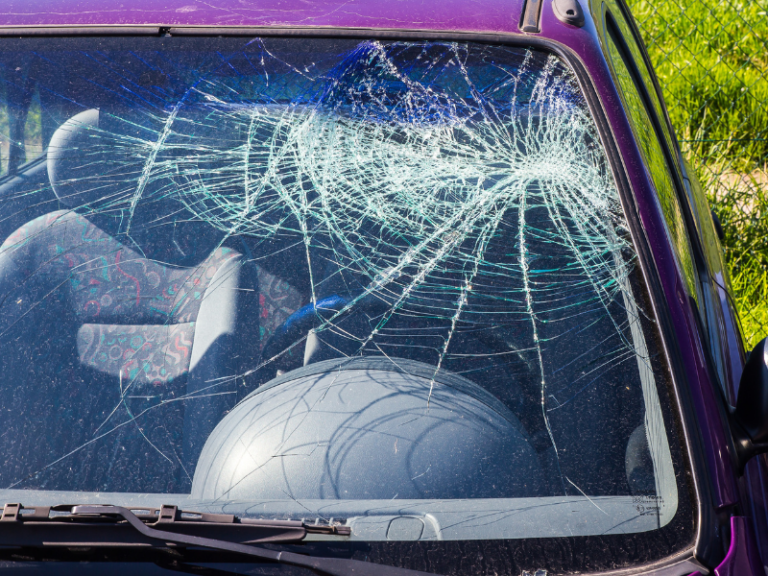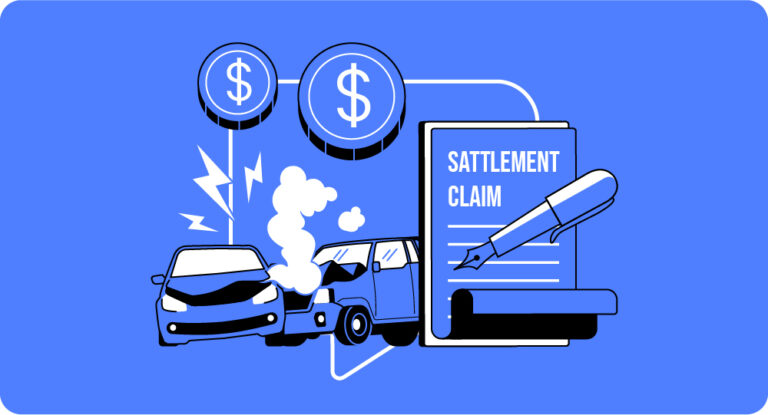- Driving Laws
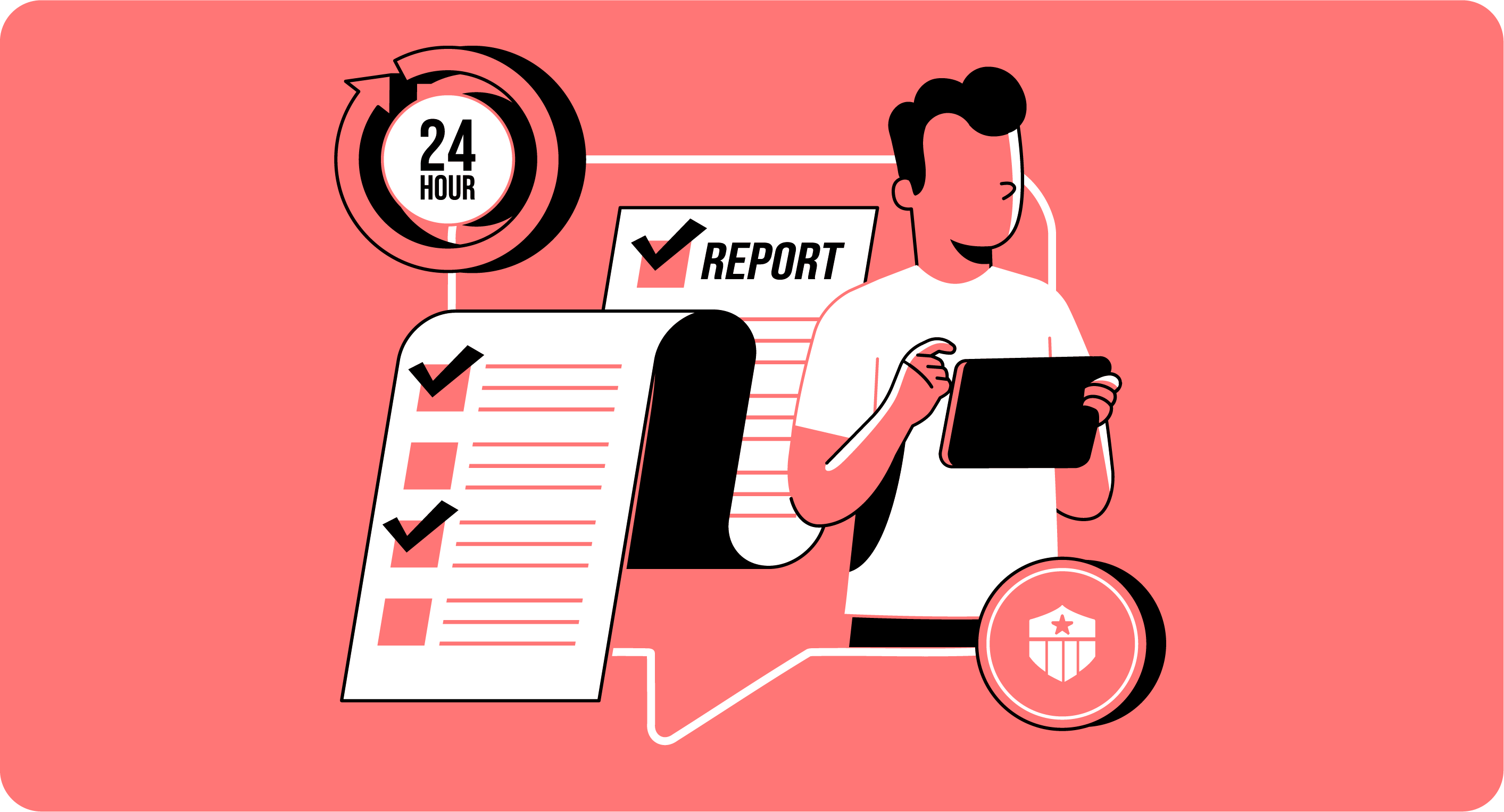
California car accidents, even minor ones, can leave you feeling dazed and confused. But amidst the shock, you need to know your legal reporting requirements. Here’s the breakdown:
- Injuries or Death: Call the California Highway Patrol or local police immediately. Within 10 days, head to the DMV and file a report using their Form SR-1.
- Property Damage over $1,000: Even without injuries, exceeding this threshold means reporting to the DMV within 10 days using the same Form SR-1.
- Insurance Company: Check your policy details or contact them directly. Most require accident reporting, even if you don’t plan to file a claim.
Remember, timely reporting protects your rights and streamlines the recovery process. Don’t get blindsided – understand your obligations after a California car accident.
Understanding the “Golden Rule” of Accident Reporting
While not a universal law, many states recommend reporting accidents within 24 hours, particularly when they involve:
Accidents Causing Injuries
This encompasses any injuries, regardless of severity, sustained by:
- Yourself: Even seemingly minor injuries, like bruises or cuts, deserve medical attention and documentation.
- Others: If anyone involved in the accident experiences injuries, reporting is mandatory.
- Pedestrians: Accidents involving pedestrians, even without apparent injuries, require immediate reporting due to their vulnerability.
Accidents with Significant Property Damage
The specific damage threshold for mandatory reporting varies by state, but it usually falls within the $500 to $1,000 range. Remember, even if the damage seems minor, reporting helps establish a clear record and protects your rights.
Hit-and-Run Incidents
Leaving the scene of an accident, even a minor one, constitutes a crime and demands immediate reporting. This applies to both drivers and pedestrians involved. Remember, failing to report such incidents carries significant legal repercussions.
What Are the Risks of Delayed Reporting?
Failing to report an accident within the recommended timeframe can trigger various detrimental consequences:
Legal Trouble
Failing to report an accident within the recommended timeframe can land you in hot water with the law, depending on the severity of the accident and your state’s specific regulations.
Fines and Penalties
Even for minor accidents with no injuries or minimal damage, neglecting to report within the stipulated window often results in fines. These fines can range from a few hundred dollars to several thousand, depending on the specific circumstances and state laws. Additionally, you may incur points on your driver’s license, further impacting your insurance rates and driving privileges.
Misdemeanor Charges
In more serious cases involving injuries or significant property damage, delayed reporting can elevate to a misdemeanor offense. This carries harsher penalties, including:
- Increased fines: Expect substantially higher fines compared to simple reporting violations.
- Community service: You may be ordered to complete mandatory community service hours.
- Driver’s license suspension: Your license could be suspended for a specific period, hindering your ability to drive legally.
Felony Charges
In extreme situations, particularly hit-and-run accidents resulting in major injuries or fatalities, leaving the scene without reporting can constitute a felony. This carries the most severe consequences, including:
- Significant prison time: The potential sentence varies depending on the severity of the accident and state laws, but it can range from months to years in prison.
- Heavy fines: Expect substantial financial penalties on top of any potential prison sentence.
- Permanent driver’s license revocation: You may permanently lose your driving privileges.
Remember: These are just general potential consequences, and the specific laws and penalties vary significantly across states. For a more accurate understanding of the legal implications of your specific situation, consulting with an experienced personal injury attorney in your state is advised.
By promptly reporting any accident, regardless of its severity, you can avoid unnecessary legal trouble and protect your rights.
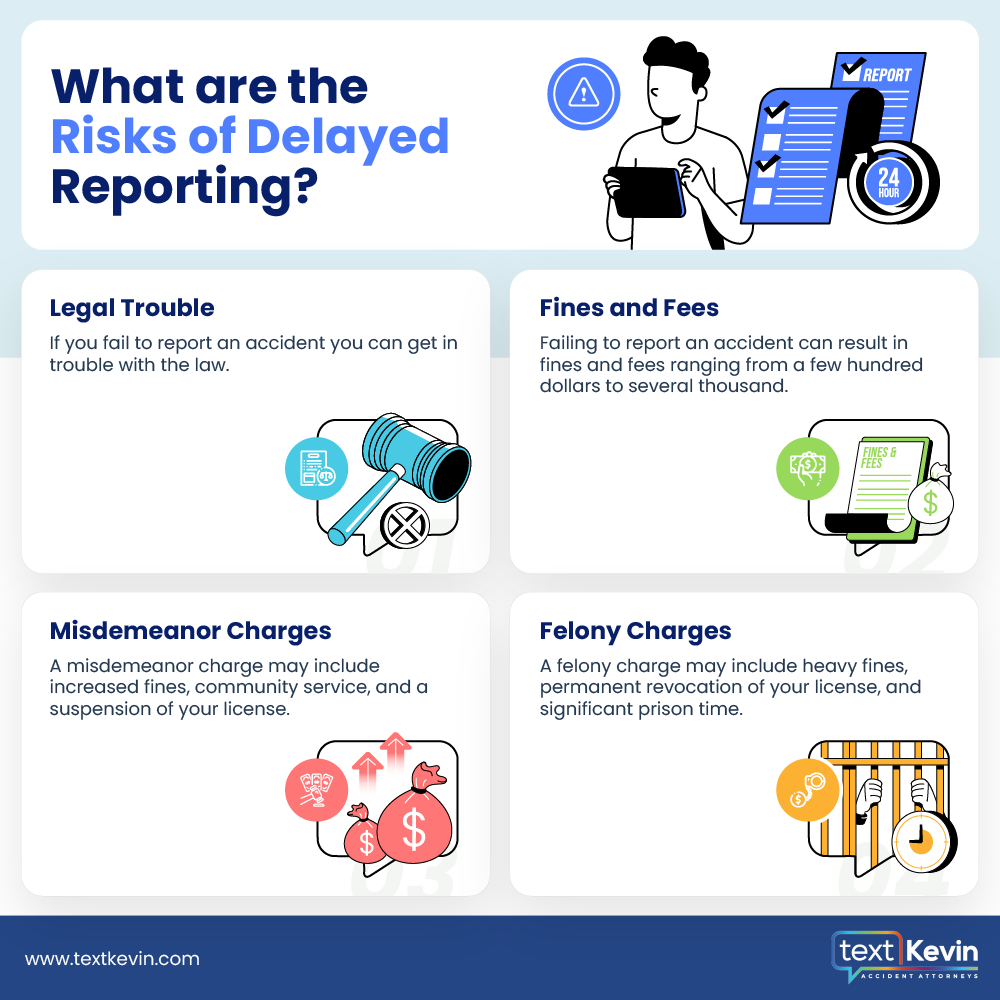
What Are the Repercussions on My Insurance Claim?
Failing to report an accident within the recommended timeframe can wreak havoc on your insurance claim, potentially leaving you financially vulnerable. Here’s how delayed reporting can negatively impact your insurance experience:
Claim Denial
The most devastating consequence is the risk of complete claim denial. Insurance companies view delayed reporting as a breach of contract or potential fraud, especially when significant time has passed. This means they may choose not to cover your accident-related expenses altogether, leaving you responsible for repairs, medical bills, and other losses.
Reduced Compensation
Even if your claim is accepted, delayed reporting can significantly reduce the amount of compensation you receive. The longer the delay, the harder it becomes for insurers to accurately investigate the accident and establish fault. This makes it easier for them to dispute your claim details or argue for a lower payout. Remember, evidence might be lost, witness memories fade, and the accident scene itself may change, hindering reconstruction efforts.
Increased Premiums
Delayed reporting can also negatively impact your future insurance rates. Since insurers view it as an indicator of increased risk, they may raise your premiums, making car insurance more expensive in the long run.
These consequences are not guaranteed, but the potential risks are considerable. To protect your right to fair compensation and minimize insurance complications, promptly report any accident to your insurance company and the authorities. Remember, the sooner they are aware of the incident, the easier it is for them to investigate and assess your claim accurately.
By prioritizing timely reporting, you can protect your financial interests and ensure a smoother insurance experience after an accident.
Evidence Gathering Challenges
The passage of time after an accident isn’t just a legal hurdle; it’s an obstacle course for gathering evidence beneficial to your case. Here’s a closer look at the challenges you might face:
Fading Memories
Human memory isn’t perfect, and details tend to blur over time. Delayed reporting means eyewitness accounts and your own recollection may become less reliable, making it difficult to reconstruct the accident accurately. This weakens your ability to establish key details like fault, contributing factors, and the severity of the incident.
Lost Physical Evidence
Accidents leave physical traces like skid marks, debris, and damaged vehicles. These valuable pieces of evidence, essential for corroborating your account and determining fault, can deteriorate or disappear over time. Weather elements, road repair, and even daily traffic can quickly erase crucial clues, hindering your ability to paint a clear picture of the accident.
Vanishing Witnesses
Witnesses play a vital role in accident investigations. However, delayed reporting makes it more likely that witnesses will become unavailable or even forget your contact information. This significantly reduces the pool of potential testimonies, weakening your case and making it harder to establish the full picture of what transpired.
Don’t let time work against you. By reporting the accident promptly and gathering evidence immediately, you empower yourself to fight for the compensation you deserve.
Is Establishing Fault More Difficult After Delayed Reporting?
Accidents are inherently stressful, but the added burden of proving fault becomes even more significant when you delay reporting. Here’s how late reporting can make establishing fault an uphill battle.
Time Lapse, Investigation Impasse
Prompt accident investigations leverage fresh evidence and witness testimonies. The longer you wait to report, the more challenging it becomes for authorities and insurance companies to reconstruct the scene accurately. Memories fade, physical evidence deteriorates, and the scene itself might change, hindering their ability to determine the exact sequence of events and contributing factors. This ambiguity often favors the other party, making it harder to prove your innocence and establish their liability.
Contested Claims, Blaming Game Begins
The other party’s insurance company, naturally, looks to protect their interests. Your delayed reporting becomes a convenient weapon to contest your claim or shift blame, arguing that the passage of time has compromised the investigation and made it impossible to determine fault definitively. This tactic can significantly reduce your compensation or even lead to complete claim denial.
Missing Pieces of the Puzzle
Witness testimonies are valuable in accident cases. However, delayed reporting increases the likelihood that witnesses will become unavailable, forget key details, or even change their stories. This lack of corroborating evidence makes it harder to establish what truly transpired, leaving you at a disadvantage in proving your side of the story.
- Tip: The burden of proof typically lies with the party seeking compensation. By delaying reporting, you essentially hand the other party an advantage by making it harder to establish fault definitively. Prompt reporting protects your right to fair compensation by ensuring a timely and thorough investigation with fresh evidence and witness testimonies.
Don’t give the other party an edge. Timely reporting empowers you to protect your rights and ensure a fair determination of fault, potentially maximizing your chances of receiving the compensation you deserve.
Every state has its own laws and regulations regarding accident reporting. It’s essential to consult with an experienced personal injury attorney familiar with your local laws to understand your specific obligations and the potential consequences of delayed reporting.
What Steps Should I Take After an Accident?
While it’s natural to feel shaken after an accident, taking the right steps immediately can significantly impact the outcome and protect your rights. Here’s a breakdown of actions to remember:
Seek Medical Attention, Even for Seemingly Minor Injuries
Regardless of how minor you might perceive your injuries to be, seeking medical attention promptly is advised. Even seemingly insignificant bumps and bruises can mask underlying issues like whiplash, and a doctor’s evaluation ensures your well-being and provides medical documentation for potential claims.
Report the Accident Promptly to Authorities and Insurance
Don’t delay reporting the accident to the authorities and your insurance company. In most states, there’s a 24-hour window for reporting, and adhering to it protects your rights and facilitates a smooth claims process. Remember, timely reporting demonstrates transparency and cooperation.
Consider Legal Guidance
Consulting with a personal injury attorney familiar with your state’s laws and regulations can be immensely beneficial. They can offer guidance on your options and advocate for fair compensation if necessary.
Remember, the actions you take immediately after an accident can significantly impact your well-being and potential legal claims. By following these steps and prioritizing safety, information gathering, documentation, medical attention, timely reporting, and potentially seeking legal guidance, you empower yourself to protect your rights and navigate the post-accident situation effectively.
Frequently Asked Questions (FAQ)
Do I have to call the police after a minor car accident in California?
While you are not legally required to call the police for accidents without injuries, death, or property damage exceeding $1,000, it’s strongly recommended in almost all cases. Even seemingly minor “fender-benders” can involve hidden damage exceeding the threshold, and you may experience delayed injuries like whiplash. Having an official record of the accident protects your rights and simplifies insurance claims later.
What if there are no injuries or damage in the accident?
Even in seemingly damage-free situations, exchanging information (names, insurance details, license plates) and filing a non-injury report with the police is advisable. This creates a record of the event, which is potentially helpful if injuries develop later or disputes arise.
How long do I have to report a hit-and-run in California?
Similar to accident reporting, you have 24 hours to report a hit-and-run to the police, regardless of the damage. Prompt reporting is crucial for law enforcement to investigate and potentially apprehend the driver who fled the scene. It also strengthens your case for pursuing insurance claims in the absence of the other driver’s information.
Additional Tips
- Regardless of the legal requirement, always prioritize safety at the scene. Check for injuries and call emergency services if needed.
- If possible, document the scene with photos and videos of the damage, vehicles involved, and the surrounding area.
- Exchange information with the other driver(s) involved, including names, insurance details, and license plate numbers.
- Even if you decide not to call the police initially, consider filing a non-injury report later, especially if you experience pain or property damage becomes evident.
Contact Attorney Kevin Crockett for a Free Consultation
If you’ve been involved in an accident and have questions about the legal implications of delayed reporting, don’t hesitate to contact Attorney Kevin Crockett for a free consultation.
Remember, time is of the essence. Seek legal guidance as soon as possible after an accident. Call (800) 900-9393 today.

Kevin Crockett
Kevin Crockett is an award-winning personal injury lawyer who understands the impact an accident can have on someone’s life. That’s why he aggressively fights for each of his clients.
